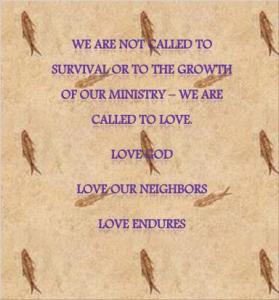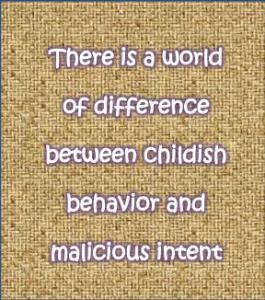I get one soda a week, and my Ginger Ale was not where I thought it should be. I was having kind of a trying day, and I almost reverted to my old ways by yelling upstairs, “Boys, which one of you took my soda!”
.
But I had that pause that Father has blessedly given me, that new found discretion. Yes, they are prone to taking my Ginger Ale, but I didn’t have any proof. The uncertainty of it was nagging at me, not knowing for sure if they did something they weren’t supposed to or if they were indeed innocent. My flesh wanted to accuse them, to get the upper hand, to find a semblance of control where I was currently uncertain. I was uncomfortable, and I didn’t like it, I was free-floating a river of unsurety. I hated being in that place, even over something small. But I decided to refrain from acting. I looked again, and I found the Ginger Ale in the place I actually put it, in the door, immediately grateful that I didn’t accuse, but still struggling with the stress brought on by the situation.
.
Welcome to the world of the control freak. Welcome to the domain of the insecure.
.
Me? Insecure? But I talk such a great game, I am bold and transparent, and I can seem so reasonable and self-assured. No, that is one of the masks of the insecure. Really, it is the most dangerous mask we can wear because it causes us to seem milder than we are. Behind the bravado lurks a person who is often very, very frightened of not being in absolute control over their surroundings, over how people perceive them, and over what people can pull over on them. We can seem to be thick skinned (although I have never been able to pull that one off), while in fact being very easily wounded. And the problem with very easily wounded people is the lengths we will preemptively go to in order to protect ourselves.
.
We are terrified of losing what is ours — we just don’t trust God enough to allow things to play out the way He wants them to. We are terrified of looking foolish if someone betrays us, so we attack them first – just in case. We anxiously dread what will happen in case of treachery, and so at the first hint of trouble, we accuse and go after the perceived threat. Or maybe we just cut them loose without a word.
.
With most of us, this happens on a small scale. Seeing something broken in the house, or having money missing from the wallet, or just something — and immediately jumping to conclusions, followed by accusations that are very rarely preceded by a diligent investigation. Yes, it falls under impatience, but even more so it is indiscreet behavior.
.
in·dis·creet — having, showing, or proceeding from too great a readiness to reveal things that should remain secret or private.
.
We all jump to conclusions in our head from time to time, but too many of us have not learned to bring it under control. Proverbs chapter 1 talks about discretion being something the young should seek out, and sadly, many adults never got any of it. Discretion isn’t only about revealing those embarrassing tidbits to the world, it is also about revealing our suspicions to the world when we have no real evidence. Frankly, the best time to accuse someone of betrayal is after the fact – not when they simply start making us uncomfortable. Better to look like someone who was taken advantage of than to become an accuser of the brethren.
.
With most of us, the damage we do is limited to our families – but what happens when we have a pulpit and a ministry?
.
A lot of us know exactly what happens.
.
When a minister is insecure, he/she is incredibly dangerous – especially when under stress. As long as an insecure person is being supported, propped up and agreed with they are the kindest people on earth and no one would think they could ever even harm a fly. But challenge them, even in private, even out of love and even when you don’t think you are even challenging them at all. Even if they only perceive a challenge to their ministry or their reputation or their discernment — watch the insecurity take control of them. Any character flaw that we do not overcome will overcome us according to the leeway we give it in our lives, especially according to the legitimacy we give that behavior as justified. That character flaw will overcome our discernment — causing injustice to seem like justice, cruelty to appear like mercy, flesh to masquerade righteousness. I know, because it has been my struggle.
.
On Sunday, as I reached for my Ginger Ale, I finally saw the answer to a question that has haunted me for years. “Why did two men who I loved, whose ministries I supported with my time and money and prayers, men who I never would have betrayed, men who were not only my congregational leaders but also close personal friends, turn on me so treacherously and so suddenly? Why did they react so violently and without a word to me? Why did they gather allies and marshal forces against me? Why, when I came to each privately about their ministries, meaning no harm but good, did they meet my love (and the trust I showed in coming to them) with such a vitriolic response?
.
Because their insecurities took over. Plain and simple. Despite having no physical nor historical reason to believe that I would do them harm (because I had only done them good), they became UNSURE as to whether or not I posed a threat to their ministry. Had they been calm and in control of themselves, they would have simply called me in order to clarify my intentions and assuage their fears. I had concerns, but did my concerns amount to an intent to betray? Not at all, as YHVH lives I loved these men and was committed to helping them, despite my concerns. Had their love for me been greater than their insecurity, they would have waited to see if I was going to betray them, they would have given me the chance to prove myself innocent through my actions over time. Had their trust in God been greater than their insecurity, they would have allowed Him to take care of the situation.
.
What did their insecurities do to me? Quite simply, their insecurity plus my immaturity made me into their sworn enemies. They took someone unwilling to betray and fashioned me into someone who really wished she had the ability to destroy them. It’s sad really – how our sin will provoke others to sin. No one sins in a vacuum. Our sins compromise those around us.
.
When I get angry and accuse my children without evidence, it shakes their confidence in me. I become the accuser and I stop being their mother. I have come to the conclusion that it is indeed better to risk betrayal, better to be tricked, better to trust and have that trust crushed, than to work proactively against those who may very well be innocent. Better to be betrayed a thousand times than to wrongly accuse without evidence even once.
.
The power of insecurity is in its ability to strip us of our reason in seconds. It strips us of our discernment, our love, our decency, our sense of justice, our very conscience. It speaks in terms of evil and we hear it as righteousness. Insecurity twists everything into unholiness, turns everything upside down. As long as we are actively insecure, we need no demons to prod us towards evil.
.
We need to learn discretion. We need to love people enough to give them time to prove our fears wrong. We need to trust God enough to let Him defend what is His. The only One who knows whether or not we will be betrayed in the future is Him, so we don’t have to fire the first volley in a war that might have never happened otherwise.
People may betray us….. but that’s their problem. If we betray them treacherously without cause because our minds are running wild… that’s most certainly our problem. Act discreetly and with righteousness and justice, and any betrayal you do face will work out for your good.
.
It gives me great peace to know now, that there was nothing I could have done to escape betrayal. Men and women blinded by insecurity are easily led astray by their fears. There are no guarantees that if I had approached either one of them differently that the outcome would have been different. I ceased to be Tyler, their beloved friend, and became an uncertainty in their lives. It was an uncertainty that they either were not willing, or able, to endure. I brought an unknown into the lives of those who needed control, and for whatever the reason that unknown was perceived as hostile. It isn’t my job to control the perceptions of others, nor is it within my ability. The battle between us happened because at some point they weren’t willing to take a chance on me, perhaps because they are not able to take a chance with anyone at all.



